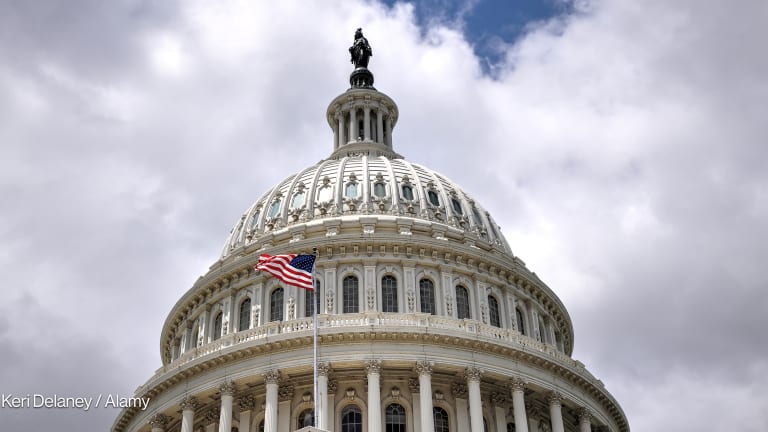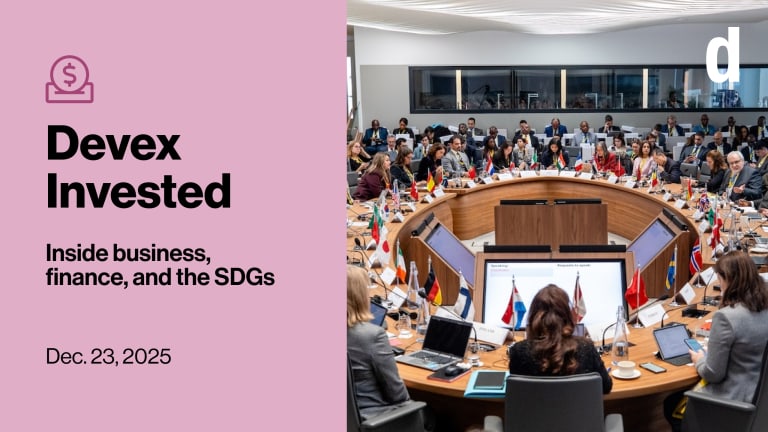US DFC's inspector general sends new CEO a list of issues to address
Anthony Zakel, inspector general at the U.S. International Development Finance Corporation, has sent new CEO Scott Nathan some recommendations as he takes the helm. Here's what Zakel suggested.
Scott Nathan has been at the helm of the U.S. International Development Finance Corporation for a month, and he’s already received some pointed advice from Anthony Zakel, the agency’s independent inspector general, in the form of a letter. The letter, which was sent this week, outlines four issues that Nathan should address at DFC to improve its operations and effectiveness. Zakel wrote that he sent the letter as part of the Office of Inspector General’s mandate to provide policy guidance to increase the “economy and efficiency” of the agency’s programs. Nathan thanks Zakel for his “candid thoughts” and welcomes a “frank and warm relationship with the OIG,” according to DFC spokesperson Pooja Jhunjhunwala, who added that Nathan continues to “listen and learn” as he works with DFC staff, the board and the stakeholder community. Here were Zakel’s four points: 1. Improving monitoring and evaluation of development impact “Several stakeholders” have asked for DFC to document and share its impact on development and U.S. economic and foreign policy objectives, the letter said. And while DFC has developed its Impact Quotient performance measurement tool, known as IQ, and created a “Roadmap for Impact,” the agency can do more, according to the letter. The inspector general said he plans to review DFC’s IQ as part of the office’s upcoming audit. But he encouraged Nathan to ensure that DFC’s organizational structure “encourages project ownership,” including monitoring and evaluating projects to measure actual impact. DFC also largely still relies on client self-reporting in its evaluations, which is not always reliable. In addition, flaws in the site monitoring processes of the Overseas Private Investment Corporation, one of the agency’s predecessors, should be considered as DFC develops its methods for evaluating projects. “Most importantly, DFC must ensure that the primary metrics of its success are actual development impact achieved and promotion of our nation’s foreign policy – not money spent,” Zakel wrote. 2. Managing organizational transition One of the key management challenges that Nathan will face is continuing to integrate former teams of both OPIC and the U.S. Agency for International Development’s Development Credit Authority, which merged into DFC in 2019, even as the agency rapidly hires new staffers and scales to meet its mandate. Nathan will need to create an organizational structure and strategy that fits the needs of the new agency, which has largely been operating based on OPIC’s structure, the letter said. The inspector general highlights that employee satisfaction and morale are critical to the success of any organization. But DFC scored among the lowest of small agencies on the 2020 Federal Employee Viewpoint Survey. Only 41% of DFC employees “had respect for senior leaders, satisfaction with the amount of information provided by management, and positive perceptions about senior leaders’ honesty, integrity, and ability to motivate employees,” according to the letter. That’s compared with an employee engagement score of 85% and an effective leadership score of 76% at OPIC in 2016, Zakel wrote. “DFC must ensure that the primary metrics of its success are actual development impact achieved and promotion of our nation’s foreign policy – not money spent.” --— Anthony Zakel, inspector general, DFC 3. Meeting heightened expectations of Congress and stakeholders A lot of eyes are on DFC — after all, it’s a young agency with big expectations. So DFC needs to communicate appropriately to lawmakers and others about how it operates so that expectations are clear as Congress considers increasing its portfolio, potentially changes how it can account for equity investments, and eventually discusses its reauthorization. The letter points to several examples of funding that was announced — some of it in 2020 — that has still not been disbursed. “While some of the time between the announcement and fund disbursement is due to circumstances beyond DFC’s control, the timing has not been as expected, which has raised questions and led to complaints from stakeholders that DFC support has not arrived as promised,” the letter said. The solution: DFC leadership needs to better educate and communicate with Congress and others about its decision-making process “to better set expectations and enhance its credibility.” 4. Implementing the BUILD Act There are a number of requirements in the BUILD Act — DFC’s authorizing legislation — that the agency still needs to address. These include improving management, transparency, and accuracy of project data, as well as meeting the agency’s goal for at least 60% of new investment projects be in low-income and lower-middle-income countries. While DFC is meeting this goal in terms of the number of projects, their dollar value is below 60% of the agency’s new investments, the letter said. As a result, DFC should work to improve and expand how it identifies viable projects in those countries. The agency should also improve its coordination and collaboration with other U.S. government agencies, including USAID, the State Department, and the Millennium Challenge Corporation, the letter said.
Scott Nathan has been at the helm of the U.S. International Development Finance Corporation for a month, and he’s already received some pointed advice from Anthony Zakel, the agency’s independent inspector general, in the form of a letter.
The letter, which was sent this week, outlines four issues that Nathan should address at DFC to improve its operations and effectiveness. Zakel wrote that he sent the letter as part of the Office of Inspector General’s mandate to provide policy guidance to increase the “economy and efficiency” of the agency’s programs.
Nathan thanks Zakel for his “candid thoughts” and welcomes a “frank and warm relationship with the OIG,” according to DFC spokesperson Pooja Jhunjhunwala, who added that Nathan continues to “listen and learn” as he works with DFC staff, the board and the stakeholder community.
This story is forDevex Promembers
Unlock this story now with a 15-day free trial of Devex Pro.
With a Devex Pro subscription you'll get access to deeper analysis and exclusive insights from our reporters and analysts.
Start my free trialRequest a group subscription Printing articles to share with others is a breach of our terms and conditions and copyright policy. Please use the sharing options on the left side of the article. Devex Pro members may share up to 10 articles per month using the Pro share tool ( ).
Adva Saldinger is a Senior Reporter at Devex where she covers development finance, as well as U.S. foreign aid policy. Adva explores the role the private sector and private capital play in development and authors the weekly Devex Invested newsletter bringing the latest news on the role of business and finance in addressing global challenges. A journalist with more than 10 years of experience, she has worked at several newspapers in the U.S. and lived in both Ghana and South Africa.








